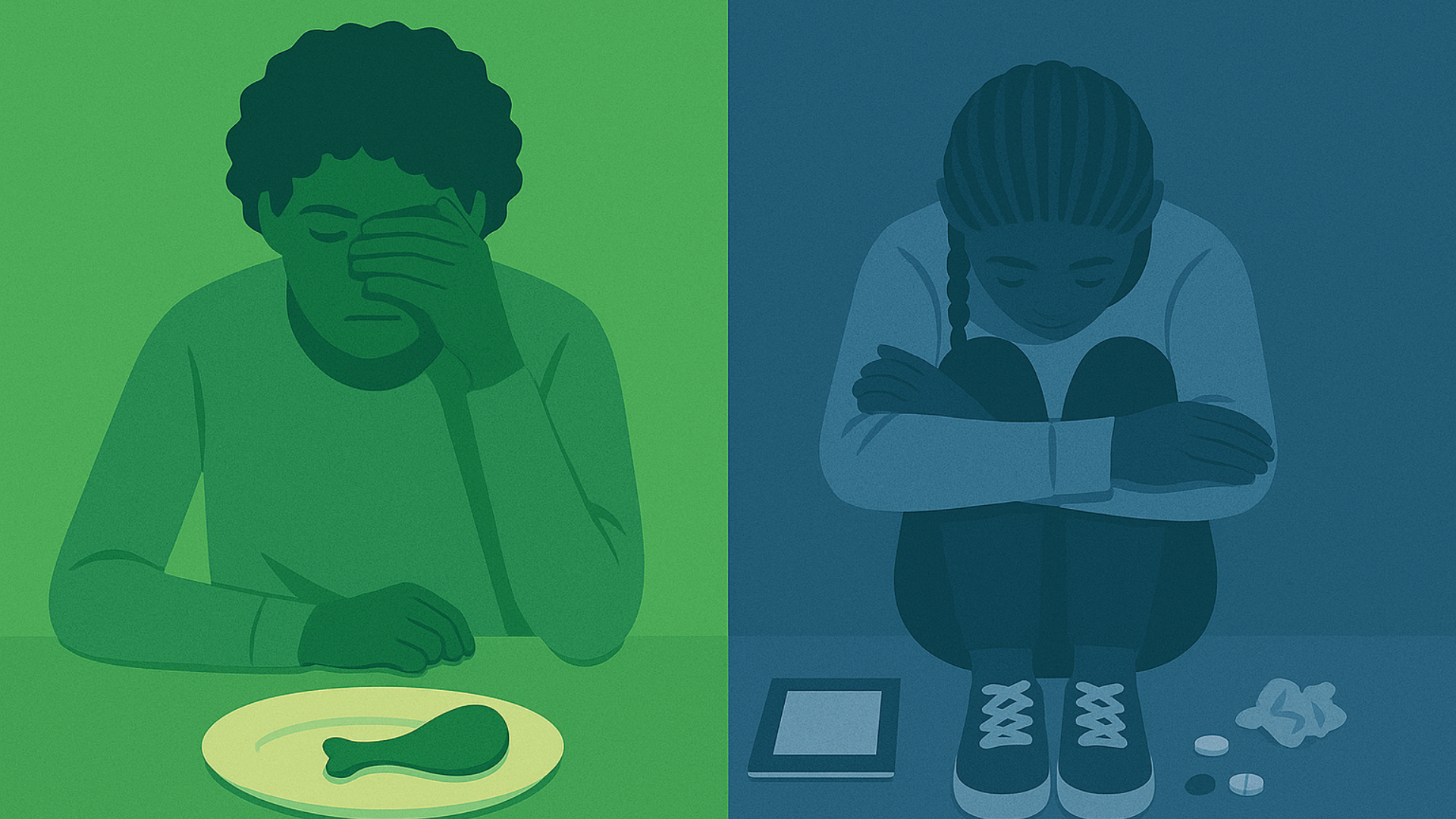Eating Disorders, Substance Abuse, and Substance Abuse Disorders

By Thrive Reno Therapist Alexandra Corona, MFT-Intern, CADC-Intern
Eating disorders commonly co-occur with substance abuse and substance use disorders (SUD), which are behavioral health conditions that develop when addiction is present. Individuals with eating disorders most typically abuse alcohol, laxatives, emetics, diuretics, amphetamines, heroin, and cocaine. Although researchers are still exploring the relationship between eating disorders and substance abuse, the prevalence of co-occurrence is evident as exemplified in the statistics below.
- According to the National Eating Disorders Association (NEDA) , up to 50% of individuals with eating disorders use alcohol or drugs, which is five times more than the general population.
- Also according to NEDA , up to 35% of individuals dependent on substances also have eating disorders, which is 11 times more than the general population.
- The Substance Abuse and Mental Health Services Administration (SAMHSA) , reports that 27% of individuals with anorexia have an SUD. SAMHSA also shares that 36% of individuals with bulimia have an SUD and that 23% of individuals with binge eating disorder (BED) have an SUD.
THE RELATIONSHIP BETWEEN EATING DISORDERS AND SUBSTANCE ABUSE
Both eating disorders and substance use disorders are extremely complex. When the two kinds of disorders co-occur, they become even more complicated, and researchers are still working to understand the associations between them.
Some individuals develop an SUD before an eating disorder, while others develop an eating disorder before an SUD. Furthermore, some theories identify disordered eating behaviors, such as binging and purging, as types of addiction in themselves. Eating disorders and SUD do share some of the same risk factors and characteristics which may help explain the high prevalence of co-occurrence.
Shared Risk Factors and Characteristics
- Family history: Many individuals with eating disorders have a family member who also experienced one. The same goes for substance use disorders. Because stigma surrounds both illnesses, many families veil them in secrecy. As a result, individuals are frequently unaware that they have a loved one who has struggled with an eating disorder or substance abuse.
- A history of trauma, abuse, or neglect: Painful experiences involving trauma, abuse, or neglect increase the risk of developing both eating disorders and substance use disorders. Both drug abuse and disordered eating behaviors can be attempts by individuals to cope with emotional pain caused by trauma, abuse, or neglect.
- Brain chemistry: Eating disorders and substance use disorders are illnesses that affect the brain. Additionally, the behaviors associated with both illnesses can become ingrained within the brain.
- Low self-esteem : Many individuals who struggle with substance abuse and/or eating disorders also struggle with low self-esteem, which can lead to feelings of worthlessness and drive unhealthy behaviors.
- Lack of family and social connection: Commonly, individuals who develop substance abuse or eating disorders lack a healthy connection with their families. Additionally, individuals who struggle with substance abuse and/or eating disorders tend to withdraw from normal social interactions. To mitigate feelings of loneliness and increase feelings of support, most treatment programs for eating disorders and substance abuse emphasize the power of establishing healthy relationships with one’s family, friends, and community.
- Impulsive personality types: Many individuals who struggle with substance abuse and/or eating disorders possess personalities that are prone to impulsivity and extremes, two characteristics of many behaviors associated with substance abuse and eating disorders.
- Compulsive behavior: Both substance abuse and eating disorders involve destructive behaviors that effectively overtake one’s life and interfere with their ability to carry out daily activities.
- Social pressures: Both substance abuse and eating disorders tend to spread within social circles, and one’s peers can influence whether they begin to engage in behaviors associated with substance abuse and eating disorders.
THE DANGERS OF DRUNKOREXIA
At the intersection of eating disorders and substance abuse, drunkorexia is a colloquial term that describes the combination of disordered eating and binge drinking, seen most often in young adults. Individuals who engage in drunkorexia behaviors may restrict their food intake, use diuretics, purge their food, or exercise excessively in order to offset the calories taken in while drinking alcohol and/or increase the feeling of intoxication. When combined, these behaviors of food restriction and drinking can cause medical consequences including dangerous blood-alcohol levels, severe dehydration, vitamin depletion, and organ dysfunction.
TREATMENT FOR EATING DISORDERS AND SUBSTANCE ABUSE
The stigma and secrecy that surrounds substance abuse and eating disorders alike can make it scary for individuals who are struggling with either or both to seek support. A simple conversation with a mental health professional, however, can put you on a path towards healing. At Thrive, we provide both outpatient and inpatient treatment that targets your mental, behavioral, and physical health. Reach out to learn more about our therapeutic services and treatment programs for co-occurring eating disorders and substance abuse.
About the Author
Thrive Reno Therapist Alexandra Corona, MFT-Intern, CADC-Intern
Alexandra “Alex” Corona was born and raised in Reno, Nevada and boasts both a bachelor’s degree in human development and family studies (HDFS) from the University of Nevada, Reno and a master’s degree in marriage and family therapy (MFT) from Capella University. As a therapist at Thrive Wellness Reno, she currently supports clients who are struggling with eating disorders and perinatal mood and anxiety disorders (PMADs). Additionally, she offers outpatient therapy services for both individuals and families, specializing in trauma, anxiety, depression, and addiction. Alex is actively working towards becoming a licensed substance abuse counselor and certified sex therapist, as she is particularly passionate about helping others improve their lives in these aspects. She finds great fulfillment in encouraging individuals to form deeper connections with themselves and with their loved ones in order to reach their full potential authentically and unapologetically.
In her personal time, Alex enjoys living life to the fullest and adventuring with family, friends, and her three dogs.
The post Eating Disorders, Substance Abuse, and Substance Abuse Disorders first appeared on Thrive Wellness.








